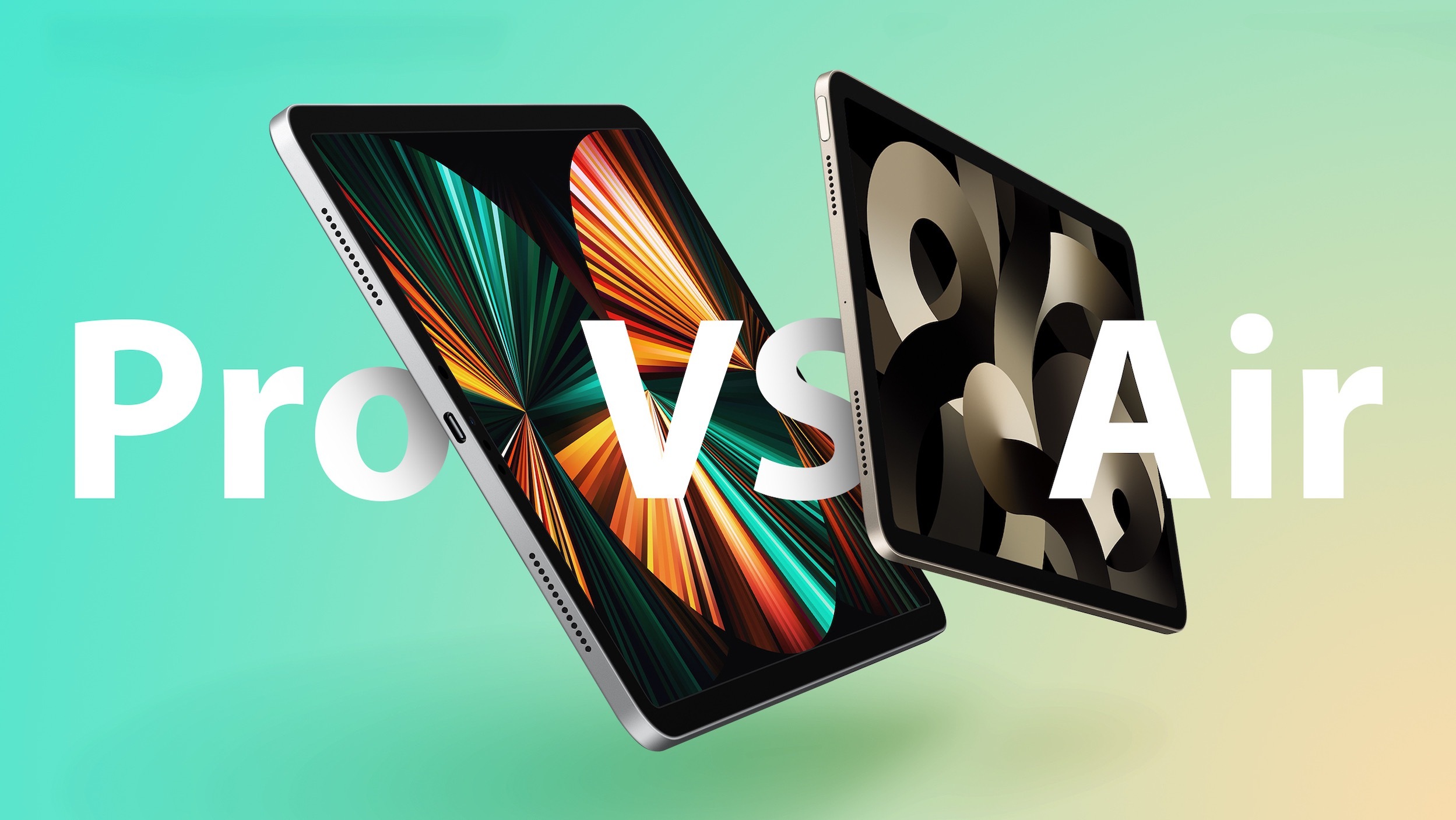
The introduction of the previous, fourth-generation iPad Air in September 2020 brought the device much closer to the iPad Pro in terms of design, and with the latest model, the iPad Air has gained the same M1 chip as the iPad Pro, bringing them even closer together. Despite this, the iPad Air and iPad Pro are still quite different devices intended for different groups of users.
Should you consider purchasing the iPad Air to save money, or do you need the high-end features of the iPad Pro? Our guide answers the question of how to decide which of these two iPads is best for you.
Comparing the iPad Air and iPad Pro
The iPad Air and iPad Pro share a large number of key features, such as a squared-off industrial design, a 12MP rear Wide camera, a 12MP front-facing Ultra Wide camera, and a USB-C port:
Similarities
- Industrial design with flat edges
- Liquid Retina display with 264 ppi, full lamination, oleophobic and anti-reflective coating, P3 Wide Color, and True Tone
- M1 chip with next-generation Neural Engine
- 5G connectivity
- ƒ/1.8 12MP Wide rear camera, with digital zoom up to 5x and Smart HDR 3 for photos
- ƒ/2.4 12MP front-facing Ultra Wide camera with 2x optical zoom out and Center Stage
- 4K video recording at 24 fps, 25 fps, 30 fps, or 60 fps, 1080p HD video recording at 25 fps, 30 fps or 60 fps, Extended dynamic range for video up to 30 fps, 3x video zoom, slo-mo video support for 1080p at 120 fps or 240 fps, time-lapse video with stabilization
- "All-day" 10 hour battery life
- Wi‑Fi 6 and Bluetooth 5.0 connectivity
- USB‑C connector
- Compatible with Magic Keyboard, Smart Keyboard Folio, and Apple Pencil (2nd generation)
Apple's specification breakdown shows that the two iPads share many of their most important features, not least the M1 chip. Even so, there are an even larger number of meaningful differences between the iPad Air and iPad Pro that are worth highlighting, including their displays, authentication technologies, and rear camera setups.
Differences
iPad Air
- Touch ID built into the top button
- 10.9-inch display
- Liquid Retina LED display
- 500 nits max brightness (typical)
- 8GB of memory
- Sub-6GHz 5G connectivity
- ƒ/1.8 12MP Wide rear camera
- Digital zoom up to 5x
- 3x video zoom
- ƒ/2.4 12MP Ultra Wide front camera with 2x optical zoom out and Center Stage
- Two speaker audio landscape mode
- USB‑C connector
- Up to 256GB storage
- Available in Space Gray, Starlight, Pink, Purple, and Blue
- Price starting at $599
iPad Pro
- Face ID enabled by TrueDepth camera
- 11-inch or 12.9-inch display, with 120Hz ProMotion technology
- Liquid Retina XDR mini-LED display on 12.9-inch model with 1,000 nits max full-screen brightness and 1,600 nits peak brightness (HDR)
- 600 nits max brightness (typical)
- 8GB or 16GB of memory
- Sub-6GHz and mmWave 5G connectivity
- ƒ/1.8 12MP Wide and ƒ/2.4 10MP Ultra Wide rear cameras with LiDAR scanner
- True Tone flash
- Digital zoom up to 5x and 2x optical zoom out
- Video zoom up to 3x and 2x optical zoom out
- Extended dynamic range for video up to 30 fps
- Audio zoom
- ƒ/2.4 12MP TrueDepth Ultra Wide front camera with 2x optical zoom out, Center Stage, Portrait Mode, and Portrait Lighting, Animoji, and Memoji
- Stereo recording
- Four-speaker audio
- USB‑C connector with support for Thunderbolt / USB 4
- Up to 2TB storage
- Available in Silver and Space Gray
- Price starting at $799
Final Thoughts
Overall, the iPad Air is the better option for the majority of users, simply on the basis of value for money. For most people, the additional $200+ needed to buy the iPad Pro will not be justified to get the likes of Face ID, a more versatile rear camera system, four-speaker audio, and a ProMotion display with refresh rates up to 120Hz.
Some iPad Pro features, such as LiDAR, the Ultra Wide rear camera, larger storage options and up to 16GB of memory, and Thunderbolt connectivity, will only be practically useful to a small niche of iPad users. Most users will never use some of these high-end features. Indeed, many features such as the True Tone flash, mmWave 5G connectivity, Audio zoom, and stereo audio recording may not be meaningfully utilized by many users.
Professionals who have a clear use case for needing larger amounts of RAM and storage, Thunderbolt connectivity, and mini-LED for HDR content will benefit from buying the iPad Pro. Prosumers will also enjoy features such as 120Hz ProMotion for smoother scrolling and gaming, deeper blacks and more vivid colors with the mini-LED display, and LiDAR for AR experiences, even if they are not necessary, and those who want a larger 12.9-inch display for content consumption will similarly need to go with the higher-end iPad Pro model.
Prosumers and professionals who want the iPad to replace their laptop or computer should likely choose the 12.9-inch iPad Pro if they are pairing it with the Magic Keyboard due to the added screen space for multiple applications. This larger iPad Pro is considerably different to the iPad Air, setting itself apart with mini-LED and a much larger display.
Beyond these individual circumstances, the iPad Air is the best option and will be more than ample for most users' needs. With the iPad Air, users can get an all-screen design, the M1 chip, practical features like USB-C and 5G connectivity, and compatibility with the latest Apple accessories.
Related Forum: iPad
This article, "iPad Air 2022 vs. iPad Pro 2021 Buyer's Guide" first appeared on MacRumors.com
Discuss this article in our forums
0 Commentaires